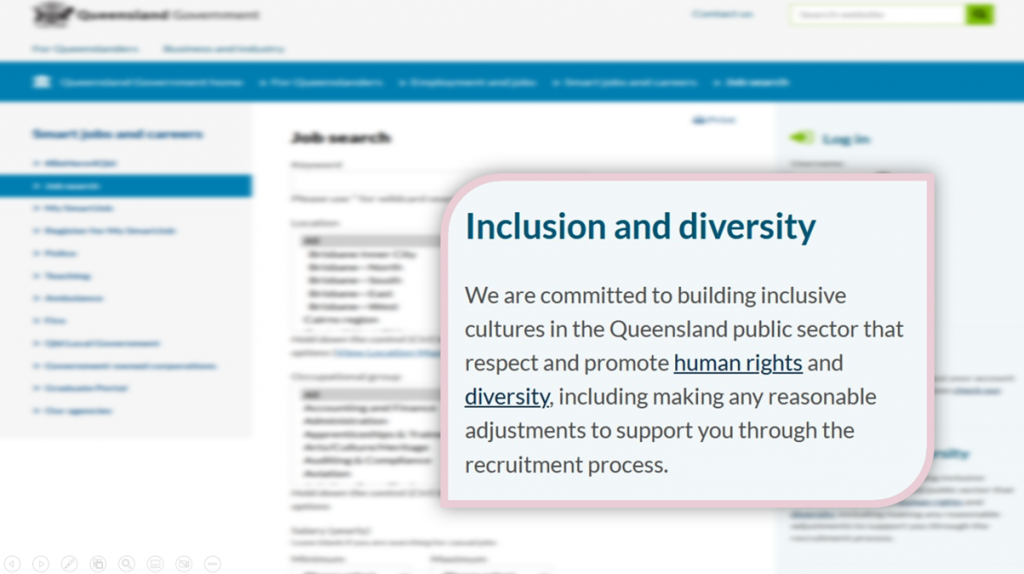Neurodiversity and Government Selection Criteria
Ask anyone and they’ll probably tell you government selection criteria response writing is a pain. Maybe it is, maybe it’s just a skill people haven’t learned yet. Either way, it’s a good way to get into employment when you’re neurodiverse. Why?
- There is a repeatable formula for applying:
Check out my You’re Overthinking the STAR Method blog for the full breakdown of applying the STAR method by answering any question by just telling the story:
“I was at x doing y when z happened. To deal with this I did a,b,c,d,e,f,g and the outcome was …“
- There are a lot less interviews:
Interviews are inherently disadvantageous to neurodiverse applicants because at their core they’re unfamiliar social situations.
Private industry you could expect multiple interviews (3-6) before you have a chance of being offered a job; government selection 99.9% of the time is a single interview.
So…can I support neurodiverse learners?
Yes, within the bounds of the range of possibilities that neurodiversity brings.

Where to Start?
This is going to end up as a series of blogs as I begin to think about things, there are more and more and more topics I need to cover.
Beginning at the beginning – what is neurodiversity? Referring Harvard Medical School
Neurodiversity describes the idea that people experience and interact with the world around them in many different ways; there is no one “right” way of thinking, learning, and behaving, and differences are not viewed as deficits.
Government Selection Criteria problem #1
“…differences are not viewed as deficits”.
Unfortunately, neurodiversity in the workplace is not well understood, much less not viewed as a deficit. The top 10 google results for Neurodiverse Workplace when I’m writing this are littered with hope:
- Neurodiversity as a Competitive Advantage
- 3 Ways to Embrace Neurodiversity In The Workplace
- The Neurodiverse Workplace: An Employer’s Guide to Managing and Working with Neurodivergent Employees, Clients and Customers
- Neurodiversity at Work – Supporting Employees Across the Spectrum
- How to Build and Support Neurodiversity in the Workplace
- Supporting a Neurodiverse Workforce
I would confidently say the truth and day to day experience of being neurodiverse in the workplace I not as rosy. For all the years the pay difference between genders has been a known issue, but still is, for a new issue I cannot see the breadth of experience being in workplaces to accommodate.
That does not mean there is no hope, it means you might have to do some of the heavy lifting for them.
Government Selection Criteria solution #1
Put neurodiversity on the table.
A bit of context on this. For a start I am making an assumption a neurodiverse person is not likely going to be applying for a role requiring a lot of interpersonal interaction and communication, nor a customer facing role or one that lacks certainty on what the role is. As such, putting neurodiversity on the table at the start gives you some accommodation and ‘wiggle room’.
By identifying as neurodiverse you’re doing several things:
- Giving yourself the opportunity to explain what that means for you to someone who may likely have no idea
- Frame neurodiversity as a positive, not a disability or inadequacy, inability, or failure
- Removing the subconscious biases you may experience for being different on the surface or at first meeting – I discuss what I mean as unconscious biases in Ageism as Unconscious Bias
Next, discrimination is illegal. According to the Fair Work Ombudsman:
Unlawful workplace discrimination under the general protections in the Fair Work Act 2009 (FW Act) occurs when an employer takes adverse action against a person who is an employee or prospective employee because of one or more of the following attributes of the person:
- race
- colour
- sex
- …
- physical or mental disability
- …
- national extraction or social origin
I would argue/hope the government as an employer would be the least likely of all to discriminate against an employee based on neurodiversity; reading neurodiversity discrimination as falling under physical or mental disability in the list above because:
- July 2022 – Recent reports have indicated a significant increase in the number of employment tribunal claims referencing disability discrimination as a result of a neurodiverse condition and we expect this trend to continue. In our latest podcast, we discuss neurodiversity and the workplace, highlighting key areas of concern for employers as well as practical steps employers can take to encourage diverse workplaces and to minimise risks of disability discrimination claims
- it is diagnosable under the DSM V.
The Reality
There are indicators on government job websites like:

Which is great! Except I have followed those links and they all refer to policies.
While policy being a statement of principles or action for an organisation is great, there is no actual advice as to how you go about getting reasonable adjustment and support in a recruitment process.
I have asked, and, the answer is to contact the panel chair/person nominated on the position description initially.
As it is the chair, it is also the other reason I suggest outing neurodiversity at the beginning. If a job applicant was a person with a physical disability for example used a wheelchair, it would be so completely and mindbogglingly ordinary to suggest the need for reasonable adjustment in the selection and interview process. So why not neurodiversity? A person who is gay would not be expected to undertake the selection process denying or pretending they weren’t gay, so why not neurodiversity? That said, being gay wouldn’t even enter the selection process as a consideration, so why not neurodiversity?
Perhaps I’m oversimplifying but it’s a goal state.
Acceptance of any disability is about normalising, demystifying, inclusion at an early age, better understanding and reducing discrimination.
Share this post

